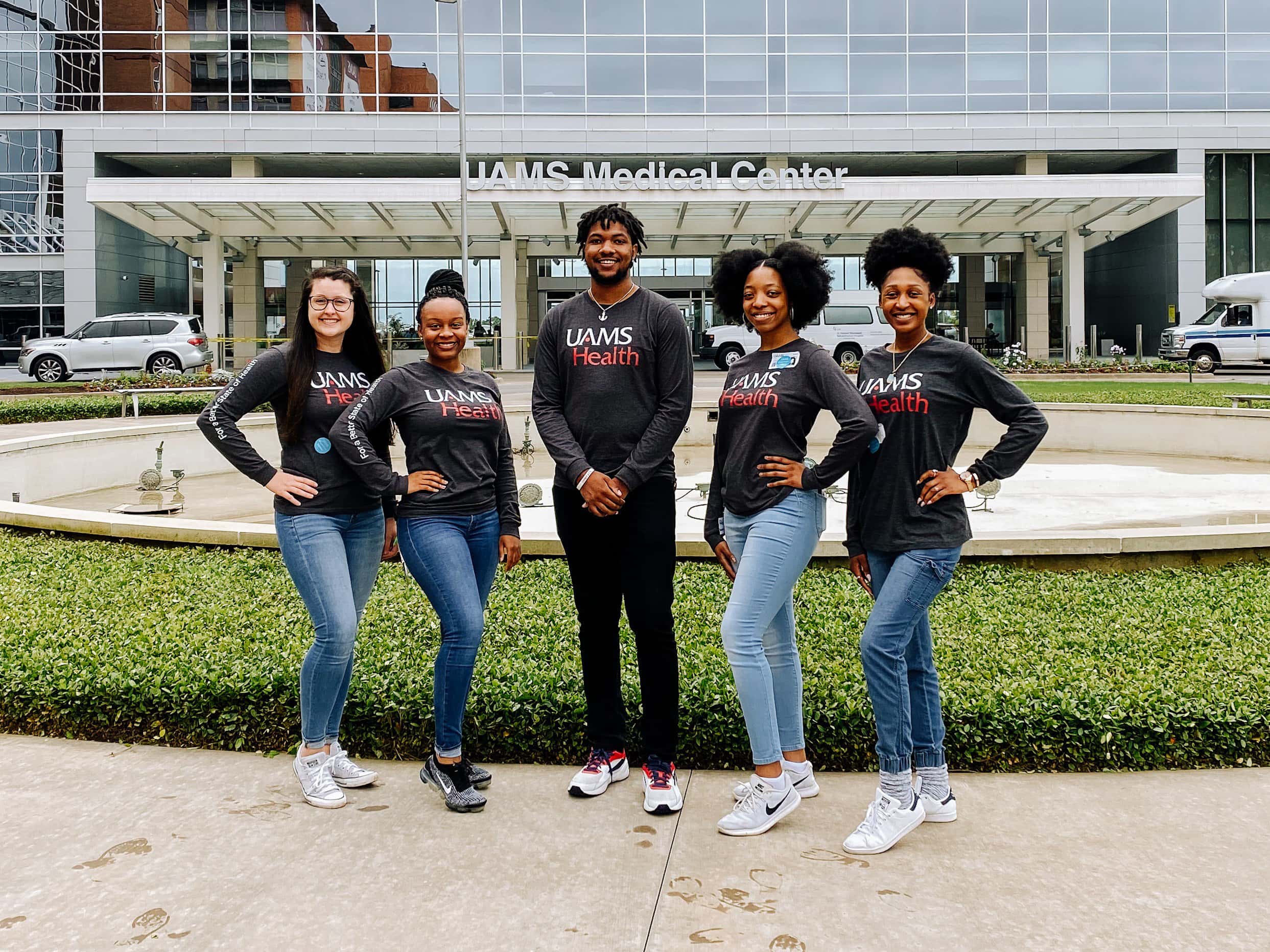UAMS’ Anesthesia Tech Program Gives HBCU Students Firsthand Look at Medical Careers
| Three students fresh out of Little Rock’s Philander Smith College recently started working in the operating room at the University of Arkansas for Medical Sciences (UAMS) as part of an initiative to help students from historically Black colleges and universities (HBCU) prepare for a career in health care.
Hunter Black, Veronica Lindsey and Raven Hinton represent the second cohort of students to become part of UAMS’ Anesthesia Tech Pipeline Program.
During the one- to two-year program, the students are paid to work 20 hours a week in the operating room as anesthesia techs. They spend additional hours each week focused on education and research.
“My goal in starting this program was to introduce the students to academic medicine through a structured blend of clinical experience, education, research and mentorship,” said Jill Mhyre, chair of the UAMS Department of Anesthesiology.
The clinical track allows them to work alongside doctors, nurse anesthetists, residents and medical students to gain insight.
“The operating room offers many real-world examples of concepts that pre-medical students need to know,” said Mhyre. For example, gas physics and oxygen transport in the bloodstream are topics tested in the day-to-day operations of the OR.
“We are essentially helping them build their resume,” said Veronica Ussery, education director of the program. “They will have a great advantage over others applying for medical school or other professions in the medical field because they will have worked in a hospital setting.”
In the educational track, they learn foundational anesthesia principles, leadership, how to become a health professional and how to prepare for graduate or medical school, including mentorship for the admissions process. In addition, the students are matched with mentors in the Department of Anesthesiology to focus on research and quality improvement. Meanwhile, they meet with representatives of various UAMS colleges to help them explore different health care pathways.
“I credit the Anesthesia Tech Pipeline Program for much of my future success,” Black said. “This program has allowed me to experience medicine, health care and interactions with physicians in a way that was unfathomable prior to my acceptance.”
Hinton said the program has given her much-needed encouragement to keep pursuing her dream of becoming a doctor.
“I am so grateful to be able to work alongside individuals who save lives,” she said. “Being a part of this program at UAMS has opened so many doors for me. When I first expressed interest in being a physician, some people told me I should consider other options. I cannot express how much it means to me to know that real physicians see something in me and are willing to share their knowledge to propel me further in pursuing this major dream. Attending medical school doesn’t seem out of reach anymore.”
Lindsey, who wants to become an anesthesiologist, said she became interested in the program a year before she was eligible to apply and was thrilled to be accepted.
“I believe this program is perfect for me,” she said. “It will improve my critical thinking skills, help me think quickly and efficiently in intense situations, and allow me to gain hands-on experience caring for patients. And it will improve my chances of getting in medical school!”
“Managing the Anesthesia Tech Pipeline Program has been a great joy,” said Chandler Wilson, manager of the program. “I am so excited to see how far this program takes our students!”
Applications for next year’s cohort will open in January, and those selected will start in the spring. More information about the program is available on the Department of Anesthesiology’s website.
The program is a partnership between the UAMS Department of Anesthesiology, the UAMS College of Medicine, the University of Arkansas at Pine Bluff (UAPB) and Philander Smith College that aims to recruit and retain highly qualified underrepresented minority students with strong connections to underserved communities in Arkansas.
It is one of five programs under the HBCU Med Track Initiative, developed in 2020 and directed by Renisha Ward, HBCU education coordinator for UAMS Regional Programs for UAPB and Philander Smith. Med Track is part of UAMS’ commitment to increasing diversity and the number of underrepresented minorities, rural and disadvantaged students entering Arkansas’ health care workforce.
The programs are supported by the Health Resources and Services Administration (HRSA) of the U.S. Department of Health and Human Services as part of a grant totaling over $7 million, with 10% financed by non-governmental sources. UAMS’ Regional Programs office is responsible for securing and administering the HRSA Medical Student Education grant that funds these and other initiatives.
